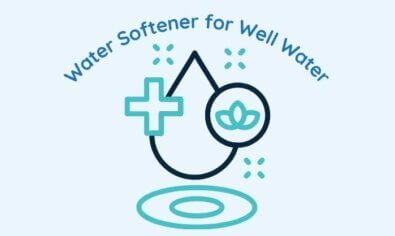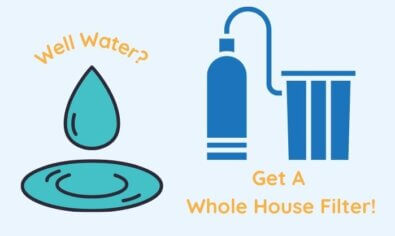How to Prevent Rust Stains on Clothes with One Simple Solution
This blog contains the following key takeaways:
• Hard water with excess iron in it causes rust stains and other problems in the wash.
• A water softener prevents rust stains by removing the contaminants that cause them.
• You can find the right water softener for your home by getting your water tested and having your system professionally installed.
• Angel Water can help you get the water softener you need to prevent rust stains on clothes for good.
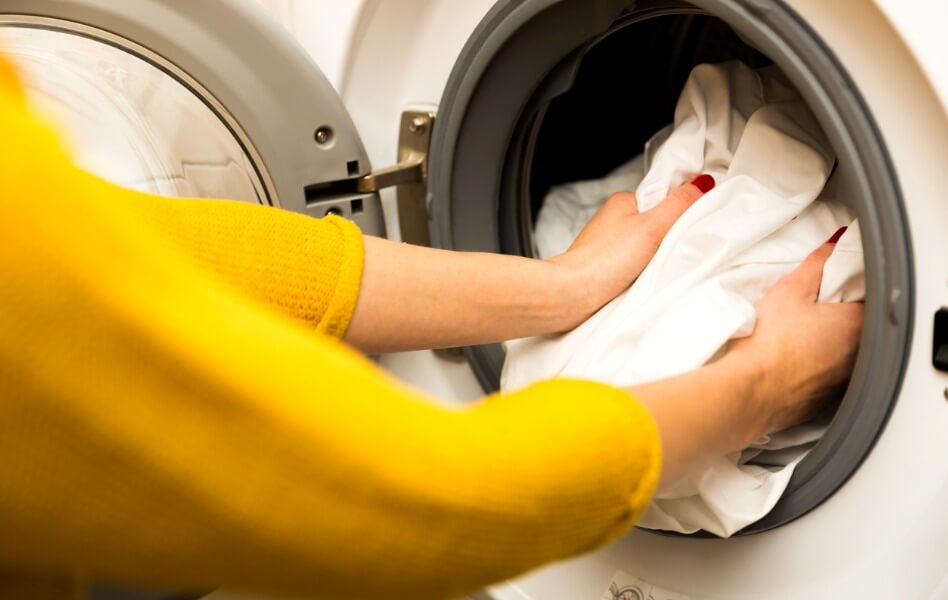
Those blogs are a dime a dozen. And quite frankly, we don’t think using a commercial rust remover or treating your clothes with salt and lemon juice is worth all that extra effort anyway.
So, we won’t waste your time with all that.
Instead, we’re here to show you how to prevent rust stains on clothes for good. Once the solution we’re talking about is in place, you won’t have to worry about finding unsightly splotches on your laundry anymore!
What could possibly make your life so much easier?
In this post, we’ll show you how a water softener solves the root of the rust stain problem. Then we’ll provide some expert advice for finding the right water softener for your home the easy way!
Already know you’d like to get a water softener? Please visit our service page to learn more about the water softener services we offer.
Your Water’s What’s Causing Those Unsightly Stains
The thing all DIY rust stain remedies have in common is they make you change the way you wash your clothes. You’ll either have to add steps to your process or use a different, more expensive detergent to get rid of those unsightly marks.
We feel all these extra steps are unnecessary burdens. After all, it’s not the way you’re washing your clothes that’s the problem. You’re doing everything right as you’ve always done. So, why should you have to change your clothes washing routine?
You’re not the one causing these stains; your water is! So, your water should be the one that has to change its ways. It only seems fair, right?
But how is your water causing these unsightly blemishes? As we’ll see, the water contains too much iron and hard water minerals, such as calcium and magnesium.
Iron Contamination Causes Those Rust Stains
Iron is a common contaminant throughout the United States and especially in the Northern Illinois and Southeastern Florida regions, which we serve here at Angel Water.
It doesn’t matter if a home gets its water from the city or a private well either. Both sources have heavy iron concentrations for different reasons.
Towns with well water, such as Roselle, IL, or Wauconda, IL, frequently experience iron contamination because iron occurs naturally in the earth’s crust and infiltrates the well. Since well water receives no municipal treatment, the iron-contaminated water goes right to the washing machine for use.
In regions with city water, such as McHenry, IL, or Fort Lauderdale, FL, the water receives municipal treatment, which can reduce the iron in the water. However, iron can still contaminate the water after treatment.
Iron contamination in city water happens when water flows through old, rusted iron pipes on its way to the home. Unfortunately, many of the water mains in the Chicago and West Palm Beach regions are old like this. So, the water winds up with a lot of iron in it.
When water containing a lot of iron mixes with chlorine bleach in the washing machine, a chemical reaction occurs causing a rusty substance to form and cling to clothing. That’s why you see those yellow, red and brown splotches when you pull your laundry out. It’s not you, it’s all that iron in your water!
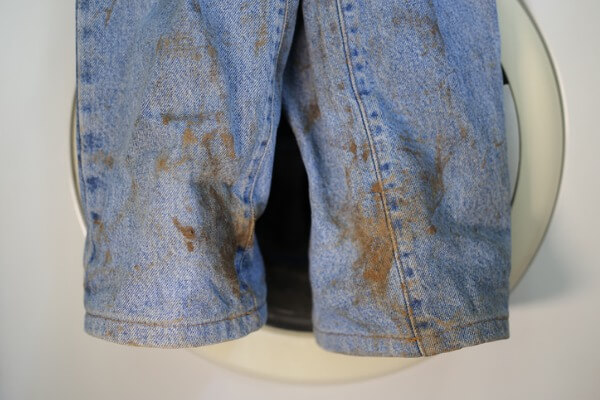
Hard Water Makes the Stains Worse
But iron isn’t the only contaminant that causes problems in the wash. Hard water minerals also damage your clothes as they swirl around in there.
Calcium and magnesium are the minerals responsible for making water hard. Most of the water used in the U.S. has an overabundance of these minerals. And regions like Chicago, IL, and West Palm Beach, FL, have particularly high concentrations. This is because the ground in these regions contains a lot of these minerals, and the water collects them as it flows through the earth.
Municipal treatment doesn’t filter out hard water minerals. So, both homes with city water and homes with well water have a lot of calcium and magnesium in their water.
Inside a washing machine, hard water can reduce a laundry detergent’s effectiveness and damage fabrics as it flows over them.
Laundry detergents don’t wash as well because they interact with the calcium and magnesium ions to form a curd. Instead of pulling dirt off the clothes, the detergent clings to the dirt and sticks to the clothes, leaving the fabric stained and soiled.
The calcium and magnesium minerals themselves are also rough on the clothing. They stick to the fabric, making it feel stiff and tearing at it to produce holes over time.
As a result, your clothes come out stained, stiff and worn out when you wash them with hard water.

A Water Softener Fixes These Problems
You can keep trying to fix those rusty, dingy clothes with special treatments. Or, if you’re sick of spending all that extra time, you can fix the root of the problem with a water softener!
How a Water Softener Prevents Rust Stains on Clothes
Water softeners fight rust and hard water stains on clothes with a scientifically proven process known as ion exchange. Here’s how it works:
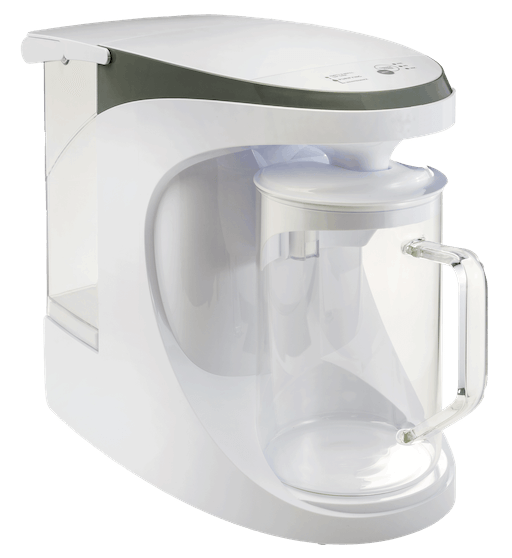
Stop Wasting Money!
Are you spending money every month on Bottled Water for your home or office? That adds up quickly and with inflation, it’s only going to cost more tomorrow.
With the NEW purAsure Counter top Reverse Osmosis System you never have to pay for another case of plastic bottles! Get yours before the price goes up and Enjoy cleaner, healthier water on demand!
First, the water softener intercepts the water before it gets to your washing machine and the rest of your home. Then it runs the water through a tank full of tiny little resin beads. These beads don’t seem like much, but they have a special power that makes them super effective at removing calcium, magnesium and iron from water: Each bead has a negative charge.
The negatively charged resin beads are like magnets for the positively charged calcium, magnesium and iron ions in the water. As the water flows through the resin, those ions jump off the water droplet and firmly attach themselves to the resin beads. The resin beads, in turn, release sodium ions into the water, which is why the process is called ion exchange.
Once the resin beads have removed all the calcium, magnesium and iron, the softener sends the water to your washing machine and all the other water-using appliances in your home.
Because the newly softened water contains no more of those pesky contaminants, it won’t disrupt the washing process anymore. Instead, your clothes will come out clean, soft and stain-free!
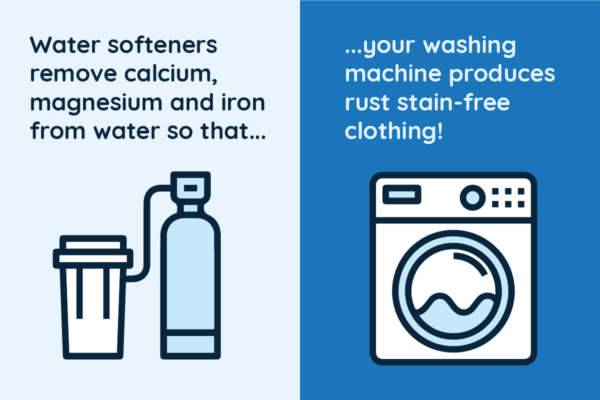
The Many Benefits of a Water Softener
We can’t overstate how much a water softener will make your laundry routine easier. Obviously, the biggest benefit is how it will keep hard water and iron from staining your laundry.
But beyond that, a scientific study from the Water Quality Research Foundation shows that using soft water makes laundry detergents much more effective at removing stains. You will also save money over time since you can use less detergent and lower water temperatures to wash your clothes! Other studies back up these findings.
Soft water can also improve your life in many other ways:
- Prevent unsightly brown stains in your toilet bowl
- Protect your skin from itchiness and your hair from brittleness
- Keep harmful clogs from forming in your plumbing
- Prevent your dishwasher from leaving white film and spots on your dishware
The best part of all these benefits is they save you from having to waste time surfing the web looking for DIY solutions. A water softener keeps all the water-using appliances in your home running smoothly so that you don’t have to think about them.
Some people balk at the significant upfront cost of purchasing a water softener. But when they stop and think about all the time, energy, stress and money it will save them in the long run, they realize it’s a worthwhile investment.
Want to keep up with the latest water softener news?
Sign up for our free email newsletter to get updates about water softeners and more delivered to your inbox!
Finding The Right Softener for Your Home is Easy
Another reason people sometimes hesitate to get a softener is shopping for water softeners can seem overwhelming. There are a lot of water softeners on the market, and it’s not always clear which ones will get rid of rust stains on clothes. After all, some water softeners are better at doing this than others.
The good news is there’s a straightforward process for finding a softener that will provide the benefits you’re looking for. Here’s how to do it:
How to Find the Right Water Softener
Start by getting your water tested. A water test will show you how hard your water is and how much iron your water contains. Based on these totals, you can shop for a softener with the capacity to effectively soften your water.
Next, explore your water softening options. But don’t settle for any old softener you find that claims it can handle the contaminants in your water. Instead, look for NSF/ANSI 44 certified water softener systems. These systems have gone through vigorous testing to ensure they live up to their claims.
Once you find the right system for your home, the last steps are to have it professionally installed and serviced regularly by a licensed plumber.
We recommend letting an expert handle these steps because installing and maintaining a complex softener system is tricky. Only a licensed plumber has the experience and credentials necessary to ensure the system works as it should and is cared for in a way that maintains your warranty coverage. So, you can enjoy your system for many years without worrying about it failing you.
Water Softener Alternatives
Of course, a water softener isn’t a one-size-fits-all solution for every home. There are some occasions in which another water treatment device may be better suited to handle the problem. It all depends on the result of the water test.
For example, if a test shows that a home has an unusually high concentration of iron in the water, then a water softener probably won’t cut it. In these instances, a reverse osmosis system or a chlorine injection system will probably be better options. A water treatment expert, like the ones at Angel Water, can help you determine which option is best during a free consultation.
Water Softeners are How to Prevent Rust Stains on Clothes
Laundry should be the least of your worries. A water softener can make it that way again by ensuring your water doesn’t muck up the process. Best of all, you won’t have to scour the web anymore looking for DIY rust stain removal techniques to try!
At Angel Water, we help homeowners in Chicagoland and Southeast Florida keep hard water stains at bay every day. Our experts are always available to help people get the proven solutions they need for cleaner and healthier water and a happier life!
Please call 847-382-7800 or visit our water softener page at the link below to learn more about how we can help you.
Want Softer Water? Schedule an Appointment Now!
Find out how a water softener can help protect your home from hard water damage. Schedule an appointment with our water specialists today to explore the best solutions for your home.

